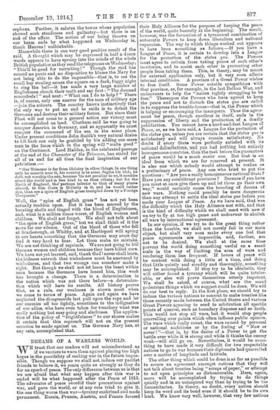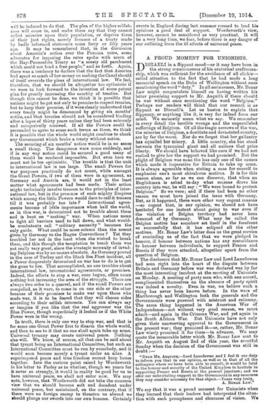DREAMS OF A WARLESS WORLD.
WE trust that our readers will not misunderstand us if we venture to warn them against placing too high hopes in the possibility of making war in the future impos- sible. Though we suppose we shall not induces our pacifist friends to believe it, we yearn quite as strongly as they do for an epoch of peace. The only difference between us is that we are afraid that what may happen after this war is ended will be what happened after the Peace of 1815. The advocates of peace overdid their precautions against war, and gave the world, or at any rate tried to give it, the one thing worse than war—tyranny enshrined and made permanent. Russia, Prussia, Austria, and France formed their Holy Alliance for the purpose of keeping the peace of the world, quite honestly at the beginning. The result, however, was the formation of a tyrannical combination of autocratic Powers to keep down liberalism and national expansion. The way in which things worked out appears to have been something as follows.—If you have a League of Peace, it is certain to develop into a League for the protection of the status quo. The Powers must agree to refrain from taking pieces of each other's territories, and to assist each other in preventing other people from taking them. This, in theory, may be meant for external application only, but it very soon affects internal conditions. A province of a Great Power wishes to free itself. Some Power outside sympathizes with that province, as, for example, in the last Balkan War, and endeavours to help the " nation rightly struggling to be free." Thereupon the Powers who have agreed to keep the peace and not to disturb the status quo are called in to suppress the trouble-house—that is, the Power which is helping or encouraging the insurgents. Thus the agree- ment for peace, though excellent in itself, ends in the suppression of liberty and the production of a deadly petrifaction. You cannot have a hard-and-fast League of Peace, or, as we have said, a, League for the protection of the status quo, unless you are certain that the status quo is satisfactory and will always remain satisfactory. No doubt if every State were perfectly satisfied with its national delimitations, and you had nothing but entirely homogeneous countries, then the task before the guarantors of peace would be a much easier one. But that is an ideal from which we are far removed at present. It is also one which nobody would attempt to realize as a preliminary of peace. Any one who tried to put the questions : " Are you a really homogeneous national State ? Have you any recalcitrant provinces ? Because if you have you must at once give them up and let them go their own way," would certainly cause the breeding of dozens of new wars. Nothing could possibly be more dangerous than any attempt to settle the ideal status quo before you made your League of Peace. As we have said, that was the difficulty which the Holy Alliance met with, and that is the kind of difficulty which we shall meet with now if we try to fly at too high game and endeavour to abolish all wars by international agreement.
In our opinion, if we try to do the great thing rather than the humble, we shall not merely fail in our main object, but shall very soon make every one feel that peace agreements are impossible, and, further, are not to be desired. We shall at the same time prevent the world doing something useful on a, small scale in the way of limiting the area of wars and rendering them less frequent. If lovers of peace will be content with doing a little at a time, and doing that little quietly and steadily and thoroughly, something may be accomplished. If they try to be idealistic, they will either found a tyranny which will be quite intoler- able, or else will prove themselves utterly impotent. We shall be asked, of course, what are the small pedestrian things which we suggest could be done. We will do our best to reply. In the first place, we should try to induce the various nations to consent to make treaties like those recently made between the United States and various Great Powers agreeing to send to arbitration all specific points of quarrel, such as boundary disputes and so forth. This would not stop all wars, but it would stop people quarrelling over points which often inflame public opinion. The wars which really count, the wars caused by personal or national ambitions or by the feeling of " Now or never ! "—that is, by the desire of a Power to get the battle over while it is strong and while it thinks the enemy weak—will still go on. Nevertheless, it would be some- thing to have made it very difficult for two respectable nations to go to war because their diplomats had quarrelled over a matter of longitude and latitude.
The other thing which could be done is as far as possible to secure an agreement amongst nations that they will not talk about treaties being " scraps of paper," or attempt to act upon principles so dishonourable. Here, again, more will be accomplished by trying to do things quietly and in an uninspired way than by trying to be too humanitarian. In theory, no doubt, every nation should keep its word and its bond even if it should be to its own hurt. We know very well, however, that very few nations will be induced to do that. The plea of the higher selfish- ness will come in, and make them say that they cannot inflict miseries upon their population, or deprive them of their just rights, merely because of a treaty made by badly informed statesmen some forty or fifty years ago. It may be remembered that, in the discussion about America's action over the Panama rates, some advocates for imposing the rates spoke with scorn of the Hay-Pauncefote Treaty as " a musty old parchment which could not bind a free people," and so forth. Again, there was a tendency to declare that the fact that America had spent so much of her money on making the Canal should of itself override the pleas of international law. We feel, therefore, that we should be altogether too optimistic if we were to look forward to the invention of some patent plan for greatly increasing the sanctity of treaties. But though this cannot bo done, we think it is possible that nations might be got not only to promise to respect treaties, but to keep their promise, if it were clearly understood that every treaty might be denounced by giving six months' notice, and that treaties should not be considered binding after a lapse of thirty years unless they had been solemnly and categorically renewed. If all the Powers could be persuaded to agree to some such terms as these, we think it is possible that the whole world might combine to check any Government which broke a treaty without notice.
The securing of six months' notice would be in no sense a small thing. The dangerous wars come suddenly, and if in any way notice could be secured a good many of them would be rendered impossible. But even here we must not be too optimistic. The trouble is that the unit in international law is too large. The small Powers for war purposes practically do not count, while amongst the Great Powers, if two of them were in agreement, as Germany and Austria are, it would not in the least matter what agreements had been made. Their action might technically involve treason to the principles of inter- national law, but in the presence of such mighty Empires which among the little Powers would dare to call it treason till it was probably too late ? International agree- ments become of little importance when half the world, as in this war, is determined not to trouble about them and is bent on " making " war. When nations mean to fight all barriers tend to fall down, and what would- be combatants call " military necessity " becomes the only guide. What could be more solemn than the assent given by Germany to the Hague Conventions ? Yet they troubled her not in the least when she wished to break them, and this though the temptation to break them was not really very great, since the strategic necesaity of invad- ing Belgium was by no means absolute. As Germany proved in the case of Turkey and the Black Sea Fleet incident, all a Power desperately determined on war has to do is to get the guns to fire. That accomplished, no one troubles about international law, international agreements, or promises. Indeed, the efforts to stop a war, once begun, often mean nothing but increasing the area of the struggle. There are always two sides to a quarrel, and if the small Powers are compelled, as it were, to come in on one side or the other because of their promises to make war upon those who made war, it is to be feared that they will choose sides according to their selfish interests. You can always say or imagine if you like that the real aggressor was the Blue Power, though superficially it looked as if the White Power were in the wrong.
In truth, there is only one way to stop war, and that is for some one Great Power first to disarm the whole world, and then to see to it that no one shall again take up arms. Universal tyranny may create universal peace. Nothing else will. We know, of course, all that can be said about that tyrant being an International Committee, but such an International Committee must be run by somebody, and it would soon become merely a tyrant under an alias. A superimposed peace and true freedom cannot keep house together. Into the curious point raised by Wordsworth in his letter to Pasley as to whether, though we yearn for it never so strongly, it would in reality be good for us to have universal peace, we shall not enter now. We may note, however, that Wordsworth did not take the common view that we should become soft and decadent under universal peace, but maintained, on the contrary, that if there were no foreign enemy to threaten us abroad we should plunge our swords into our own bosoms. Certainly events in England during last summer seemed to lend his opinions a good deal of support. Wordsworth's view, however, cannot be considered as very practical. It will be a very long time, we fear, before there is any danger of our suffering from the ill effects of universal peace.







































 Previous page
Previous page